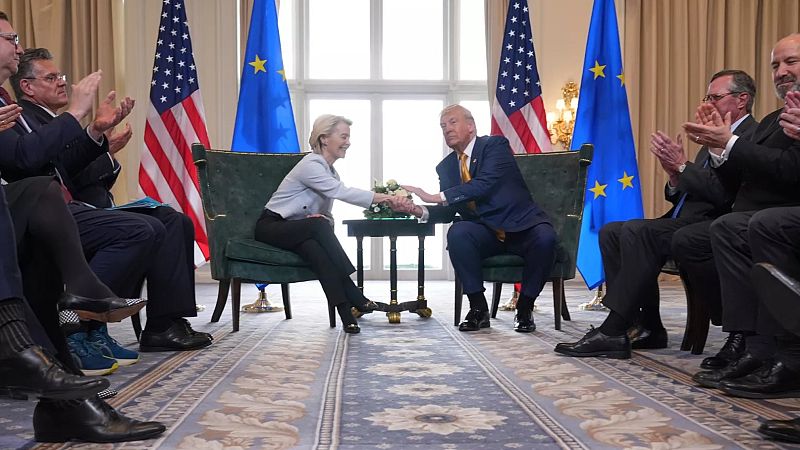Germany’s economic sentiment fell sharply in August, snapping a three-month recovery and casting renewed doubts over the country’s growth outlook.
The decline follows a controversial EU–US trade deal that has disappointed financial experts and left key industrial sectors exposed to steeper tariff burdens.
The ZEW Indicator of Economic Sentiment dropped by 18 points to 34.7 in August, falling well short of expectations for a more modest retreat to 40.
This reverses part of the strong recovery seen in July, when sentiment had climbed to its highest since February 2022.
The gauge for current conditions also deteriorated, slipping to -68.6 from -59.5 a month earlier, missing forecasts of -60.
The downturn reflects concerns over Germany’s weak second-quarter performance and the perceived asymmetry of the newly signed transatlantic trade pact.
“Financial market experts are disappointed by the announced EU–US trade deal,” said ZEW president, professor Achim Wambach.
“In August 2025, the ZEW indicator experiences a substantial decline, also due to the poor performance of the German economy in the second quarter. The outlook has worsened in particular for the chemical and pharmaceutical industries. The mechanical engineering and metal sectors as well as the automotive industry are also severely affected.”
Sentiment across the eurozone mirrored Germany’s decline. The ZEW expectations index for the bloc dropped 11 points to 25.1, while the gauge of current conditions fell by 7 points to minus 31.2.
Initial hopes of relative resilience in the eurozone have been tempered as economists revise down growth expectations for the second half of the year.
On 27 July, just days before a 30% US tariff on EU goods was set to take effect, European Commission President Ursula von der Leyen and US President Donald Trump reached a last-minute agreement.
The accord included a basic 15% tariff on EU exports, with steeper levies of 50% on steel, aluminium and copper. Aircraft and aircraft parts were exempted.
As part of the deal, the EU also pledged to purchase $750 billion (€685 billion) in US energy exports over three years. The political optics were widely seen as favourable to Washington.
Related
“A one-sided trade deal to reduce the US trade deficit with the EU,” remarked Oliver Rakau, chief Germany economist at Oxford Economics.
“Politically, this agreement looks like a clear win for the US,” he added.
Story Continues
The deal “is at the better end of the spectrum of what could realistically be achieved,” Isabelle Mateos y Lago, economist at BNP Paribas, noted.
She highlighted that the effective tariff rate has been multiplied tenfold compared to the start of the year, though she sees the shock as manageable given exports to the US account for under 3% of EU GDP.
Bill Diviney, economist at ABN Amro, described the agreement as a product of Europe’s weak bargaining position, highlighting economic stagnation and rising inflation pressures.
“Berlin and France were unwilling to suffer economic pain to risk a better outcome,” he said.
“The EU remains dependent on the US for its security, both in terms of military support as for military imports and remains a net importer of energy,” he added.
Market reaction to the ZEW release was muted. Germany’s DAX index remained broadly steady at 24,050 points. The euro dipped slightly, down 0.1% to $1.1600.
Investor focus now turns to the upcoming US inflation report for July, with the Consumer Price Index expected to have risen 2.9% year-on-year, up from 2.7% in June.
Markets are watching closely for any signs that higher tariffs are beginning to filter through to consumer prices.
Money markets continue to price in an 85% probability of a 25-basis-point rate cut by the Federal Reserve at its next meeting, as signs of cooling labour market strengthen the case for easing.
